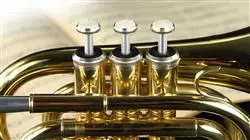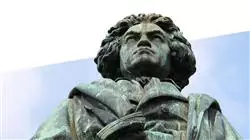University certificate
The world's largest faculty of humanities”
Description
TECH offers you an avant-garde and exhaustive program with which you will be able to work on the most innovative fundamentals of Musicology through a journey from its evolution to the present day"

Music covers a very broad cultural spectrum. From the origin of time and up to now, the melodies and sounds that have emerged from musical compositions, whether studied or improvised, have accompanied man throughout the centuries, representing each era and culture with notes and chords. For this reason, the musicologist is not only in charge of studying the technique of this art (solfège, harmony, structure, tempo, etc.), but also analyzes the characteristics of the different niches all over the planet, being able to collaborate in anthropological, artistic and cultural studies through the observation of the sound pieces or instruments used by a civilization.
It is, therefore, a discipline that integrates a wide range of professional opportunities, from the field of research to teaching, as well as being able to contribute to the creation of new pieces that expand the musical catalog that exists today. That is why you can count on this complete and exhaustive program, a dynamic, multidisciplinary and innovative syllabus with which you will learn not only about the history and the ins and outs of this field, but also specialized information about it. In addition, you will work intensively on acquiring the pedagogical, didactic and analytical skills of an expert in the field, through 1,500 hours of theoretical, practical and additional content.
In addition to the syllabus, you will have at your disposal practical and self-knowledge exercises, complementary readings, research articles, news, dynamic summaries and detailed videos to contextualize the information and delve into the sections you consider most important and relevant for your professional performance. All this, presented in a convenient, 100%-online program with complete accessibility from any device with an Internet connection. This way, you will not have to worry about on-site classes or restricted schedules, and you will be able to design your own calendar and organize it to get the most out of this academic experience.
You will have 1,500 hours of multidisciplinary content to delve into aspects such as analysis or music pedagogy, among others"
This professional master’s degree in Musicology contains the most complete and up-to-date program on the market. The most important features include:
- Practical cases presented by experts in Musicology
- The graphic, schematic and practical contents of the book provide technical and practical information on those disciplines that are essential for professional practice
- Practical exercises where self-assessment can be used to improve learning
- Its special emphasis on innovative methodologies
- Theoretical lessons, questions to the expert, debate forums on controversial topics, and individual reflection assignments
- Content that is accessible from any fixed or portable device with an Internet connection
The best program in today's academic market to delve into music pedagogy like never before: through an innovative and cutting-edge system"
Its teaching staff includes professionals from the sector who bring their work experience to this program, in addition to recognized specialists from leading societies and universities.
The multimedia content, developed with the latest educational technology, will provide the professional with situated and contextual learning, i.e., a simulated environment that will provide immersive education programmed to learn in real situations.
This program is designed around Problem-Based Learning, whereby the professional must try to solve the different professional practice situations that arise during the academic year. For this purpose, the student will be assisted by an innovative interactive video system created by renowned and experienced experts.
A 100% program that will elevate your talent as a Musicologist to the highest professional level through a challenging program that meets the demands of today's industry"

You will have unlimited access to the virtual campus 24 hours a day, so you will be able to organize your schedule according to your own availability"
Objectives
The broad spectrum of musical topics covered by the profession of Musicology, as well as the highly specialized knowledge required by anyone working in this field to succeed in it, is what has led TECH to develop this professional master’s degree. Therefore, the objective is to gather, in a single degree, the most exhaustive and innovative information related to this artistic and cultural field, thanks to which, the graduate can obtain the specialized management required for this work in the academic, theoretical, discursive and research sector.

The more ambitious your objectives are, the more you will be able to take advantage of this professional master’s degree thanks to the quantity and quality of the theoretical, practical and additional material it includes"
General Objectives
- Practice, identify and get to know characteristic rhythmic facts: syncopation, anacrusa, etc.
- Awakening the student's critical sense
- Master the main pedagogical strategies of music education and their relation to teaching methods
- Activate the capacity of memorization and psychomotor coordination
- Reason and debate on a musical work or text, placing them within the framework of the aesthetic-musical problems they pose
Specific Objectives
Module 1. The History of Music I
- Understand the origins of the music we know
- Be aware of the strong connection between music and the church from its beginnings
- Distinguish the characteristics of each musical stage in history and art history
- Know the instruments that were used in each stage of music
Module 2. Musical Language
- Encourage the creative development of students
- Value musical language as a fundamental tool
- Develop to the maximum the creative and rhythmic capacities of each individual
- Master the language and reading of musical scores
- Obtain an optimal tuning capacity
- Use the "inner ear" to relate hearing to its graphic representation, as well as to recognize timbres, formal structures, dynamic, expressive, temporal indications, etc.
Module 3. Aural Education
- Know the components of music showing a high level of mastery in auditory perception, reading, analysis, writing, improvisation and musical creation, and be able to interrelate all this to apply it and use it properly in the development of their own activity
- Being able to develop an educational-musical practice as an artist and music educator
- Develop the inner musical ear as a basis for individual or group performance
- Learn to carry out aural analysis without music score
- Improve the capacity of intonation and its link with the musical ear
Module 4. The History of Music II
- Delve into the musical styles of the contemporary period, getting to know their outstanding authors
- Learn the most important pieces from contemporary composers
- Study the great musicians of the history of music following the chronological line
Module 5. Music Didactics
- Know the fundamentals of Music Education, the evolutionary development of students in Early Childhood Education in relation to Music Education and the music syllabus in Early
- Childhood Education
- Acquire basic rhythmic, vocal, instrumental and auditory training
- Discover and learn about different pedagogical-musical methods
Module 6. Music in Asia
- Know and value the heritage of East Asia and South Asia in order to facilitate intercultural relations (cooperation and development, protocol, negotiation, decision-making, cultural exchanges, equality policies, etc.)
- Know the historical particularities of the cultural development of Asia, as well as appreciate its current emergence
- Understand the phenomenon of human movement and issues of ethnic and cultural identity in East and South Asian societies
- Recognize the different musical instruments and main repertoires from East and South Asia
Module 7. Musical Aesthetics
- Understand and manage the main concepts elaborated over time by musical thought
- Know the main currents of musical aesthetics, through a systematic study of the main problems dealt with by the discipline
- Make a critical judgment on a given musical reality, placing it in the context of the great aesthetic-musical polemics
- Develop the intellectual maturity of the student, his ability to understand, to relate and to make a critical judgment on a given aesthetic problem
Module 8. Musical Analysis
- Perceive, through listening, both by conventional means and with the use of technologies, the elements and procedures that make up a musical work and grasp the diversity of resources and essential features it includes
- Recognize the features of the main musical styles: harmony, melody, texture, rhythm, instrumentation, ornamentation, etc. and be able to detect some of these features in works belonging to different periods or styles as reminiscences of the past
- Understand the relationship between music and text in vocal works or vocal and instrumental works in different historical periods
- Acquire a lexicon and terminology adequate to express and describe, orally and in writing, the analytical processes associated with the study of musical works and styles, as well as musical processes, paying attention not only to the objective component of music but also to the subjective component, what the listener perceives
- Know the music of other cultures, their characteristics, the feelings they provoke and the function they fulfill in their social-historical context, learn to value them and understand the influence they have had on Western music throughout history
Module 9. Musical Pedagogy
- Compare the different tools of musical learning
- Plan educational actions and precise orientations to favor the development of each learning style
- Discuss the consideration of learning styles and their repercussion on the different educational stages
- Propose intervention strategies and musical educational projects
- Apply instruments and tools in musical learning
- Organize the teacher's decision-making process
- Propose specific lines of action in musical practice
- Know the neuropsychological basis of music
Module 10. Musical Notation
- Know the basic principles of vocal musical notation from the Middle Ages to the Baroque according to the criteria of scientific transcription
- Apply correctly the criteria and methods of critical edition in the musicological field and the paleographic techniques of transcription of instrumental music, from the Middle Ages to the present day
- Know the manuscripts and sources of music through the historical course
- Acquire the resources to be fluent in any repertoire of historical music in its original writing

Would you like to learn how to use the different tools for teaching music? With this professional master’s degree, you will not only achieve it, but you will also stand out from the rest of the professionals because of your mastery thereof"
Professional Master's Degree in Musicology
Music is a fundamental element in Culture, and since its origins it has evolved and accompanied human beings throughout the ages. Therefore, the musicologist not only studies the techniques of the Art, but also analyzes the cultural and anthropological characteristics of the different musics and instruments used by each civilization. This discipline offers multiple professional opportunities, from research to teaching or the creation of new musical pieces. Therefore, this Professional Master's Degree in Musicology offers specialized knowledge in the field, as well as pedagogical, teaching and analytical skills typical of the expert in the field.
Travel through the History of Music with TECH
With 1,500 hours of theoretical, practical and additional content, the student will have access in this Professional Master's Degree in Musicology to practical exercises and self-knowledge, complementary readings, research articles, dynamic summaries and detailed videos, delving into the most relevant aspects for their professional performance. Through these resources, you will go through the History of Music, Musical Language, Auditory Education or Musical Teaching, among other modules. In addition, the program is presented in a 100% online format, accessible from any device with an Internet connection and with the freedom for the student to create their own schedule, organizing the materials according to their needs.







